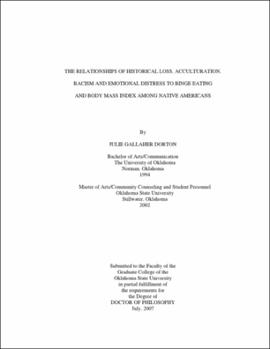| dc.contributor.advisor | Winterowd, Carrie L. | |
| dc.contributor.author | Dorton, Julie Gallaher | |
| dc.date.accessioned | 2013-11-26T08:27:38Z | |
| dc.date.available | 2013-11-26T08:27:38Z | |
| dc.date.issued | 2007-07 | |
| dc.identifier.uri | https://hdl.handle.net/11244/6940 | |
| dc.description.abstract | Scope and Method of Study: The purposes of this study were to explore the relationships between and among historical loss, acculturation, racism, emotional distress, binge eating, and body mass index among Native American people as well as to identify significant predictors of binge eating and body mass index. Participants included 269 Native American adults who were solicited via e-mails using a snowball data collection technique. They completed an on-line survey including the following measures: a demographic page, the Historical Loss Scale (HLS)/ Historical Loss Associated Symptom Scale (HLASS; Whitbeck, Adams, Hoyt, & Chen, 2004), the Native American Acculturation Scale (NAAS; Garrett & Pichette, 2000), the Schedule of Racist Events Generic (SRE-G; Lang, 2001), the Depression, Anxiety, Stress Scale (DASS-21, Lovibond & Lovibond, 1995), Binge Eating Scale (BES; Gormally, Black, Daston, & Rardin, 1982), and the Eating Disorder Diagnostic Scale (EDDS; Stice, Telch, & Rizvi, 2000). Pearson correlations, multiple regression, and forward regression analyses were conducted to explore bivariate and linear relationships among the main study variables. | |
| dc.description.abstract | Findings and Conclusions: Body mass index levels among Native American people were not associated with binge eating behaviors, emotional distress in general, cultural distress (as measured by historical loss and racism), or acculturation. These variables only accounted for 2% of the variance in body mass index scores. Native American people in this sample who engaged in binge eating tended to experience emotional distress as well as cultural distress including feelings associated with historical losses as well as experiences and stress associated with racism. Emotional distress, feelings about historical loss, and experiences of racism accounted for 22% of the variance in binge eating behaviors. Emotional distress was the most significant predictor of binge eating behaviors (accounting for 18% of the unique variance in binge eating scores) followed by lifetime incidences of racism (1.3% ) and stress associated with racism (1.2%). It may be important to assess the emotional states related to binge eating along with the coping styles of those who are overweight or obese. Further research is needed to understand the personal and cultural factors associated with binge eating and obesity among Native American people. | |
| dc.format | application/pdf | |
| dc.language | en_US | |
| dc.rights | Copyright is held by the author who has granted the Oklahoma State University Library the non-exclusive right to share this material in its institutional repository. Contact Digital Library Services at lib-dls@okstate.edu or 405-744-9161 for the permission policy on the use, reproduction or distribution of this material. | |
| dc.title | Relationships of historical loss, acculturation, racism and emotional distress to binge eating and body mass index among Native Americans | |
| dc.contributor.committeeMember | Bosewell, Don | |
| dc.contributor.committeeMember | Carlozzi, Barbara | |
| dc.contributor.committeeMember | Bartlett, Jan | |
| dc.contributor.committeeMember | Moses, George | |
| osu.filename | Dorton_okstate_0664D_2458.pdf | |
| osu.accesstype | Open Access | |
| dc.type.genre | Dissertation | |
| dc.type.material | Text | |
| dc.subject.keywords | native american | |
| dc.subject.keywords | obesity | |
| dc.subject.keywords | binge eating | |
| dc.subject.keywords | historical loss | |
| dc.subject.keywords | racism | |
| dc.subject.keywords | mental health | |
| thesis.degree.discipline | Counseling Psychology | |
| thesis.degree.grantor | Oklahoma State University | |
